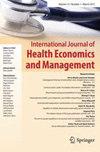The European principle „rehabilitation–integration–return to the labor market“ and disability assessment
IF 1.5
4区 经济学
Q3 BUSINESS, FINANCE
International Journal of Health Economics and Management
Pub Date : 2020-04-23
DOI:10.14748/hem.v19i3.6604
引用次数: 0
Abstract
: Introduction: The restoration of the working ability with a definite period of employment is enshrined in the definition of the Expert Committee of Rehabilitation at WHO (1958). In Bulgaria, the Territorial Expert Medical Committees (TEMCs) only carry out a medical assessment of disability, and the social assistance based on it is the Social Assistance Agency’s commitment. The purpose of this article is to explore the importance of the expert decision (disability assessment) for the implementation of the principle „rehabilitation-integration-return to the labor market“. Material and Methods: The opinion of 612 patients with disabilities, certified/re-certified by General TEMC (St. Marina Hospital, Varna), was examined. The extract represents 10.2% of those who passed through the Commission in 2017 and was formed in accordance with the inclusion and exclusion criteria. They are organized in the following areas: Results and Discussion: The analysis of the demographic indicators of the persons included in the given extract allows us to get an idea of the characteristics of this vulnerable group in Varna region’s society. 85.9% of them are persons of working age (16 to 65 years), 64.1% are married, 59.6% are living in a regional city and 40.5% are without employment . Only 4.4% (n = 612) of the persons with a TEMC-determined invalidity/ disability considered rehabilitation sufficient. 81.9% (n = 209) of those who were denied a disability rate during their last re-certification reported that they were not advised to rehabilitation. Conclusion: The study of the principle „rehabilitation-integration-return to the labor market“ under the current Bulgarian legislation reveals a number of problems that do not allow its implementation. In Bulgaria, the activity of TEMC is oriented towards determining the medical assessment of disability without the possibility of introduction to mandatory rehabilitation and control afterwards.欧洲原则“康复-融合-重返劳动力市场”和残疾评估
世界卫生组织康复专家委员会(1958年)的定义规定,在一定的就业期内恢复工作能力。在保加利亚,领土专家医疗委员会(temc)只对残疾进行医疗评估,并在此基础上提供社会援助是社会援助机构的承诺。本文旨在探讨专家决策(残疾评估)对于实施“康复-融入-重返劳动力市场”原则的重要性。材料和方法:对612例经通用TEMC(瓦尔纳圣玛丽娜医院)认证/再认证的残疾患者的意见进行调查。该提取物代表了2017年通过委员会并根据纳入和排除标准形成的10.2%。调查结果和讨论:对所列人员的人口指标的分析使我们能够了解瓦尔纳地区社会中这一弱势群体的特点。其中85.9%的人处于工作年龄(16至65岁),64.1%的人已婚,59.6%的人居住在区域城市,40.5%的人没有工作。只有4.4% (n = 612)的temc确定的残疾/残疾患者认为康复足够。81.9% (n = 209)在最后一次重新认证时被拒绝残疾率的人报告说他们没有被建议康复。结论:对现行保加利亚立法下的“康复-融入-重返劳动力市场”原则的研究揭示了一些不允许执行的问题。在保加利亚,TEMC的活动侧重于确定对残疾的医疗评估,而不可能在之后实行强制性康复和控制。
本文章由计算机程序翻译,如有差异,请以英文原文为准。
求助全文
约1分钟内获得全文
求助全文
来源期刊
CiteScore
3.60
自引率
0.00%
发文量
18
期刊介绍:
The focus of the International Journal of Health Economics and Management is on health care systems and on the behavior of consumers, patients, and providers of such services. The links among management, public policy, payment, and performance are core topics of the relaunched journal. The demand for health care and its cost remain central concerns. Even as medical innovation allows providers to improve the lives of their patients, questions remain about how to efficiently deliver health care services, how to pay for it, and who should pay for it. These are central questions facing innovators, providers, and payers in the public and private sectors. One key to answering these questions is to understand how people choose among alternative arrangements, either in markets or through the political process. The choices made by healthcare managers concerning the organization and production of that care are also crucial. There is an important connection between the management of a health care system and its economic performance. The primary audience for this journal will be health economists and researchers in health management, along with the larger group of health services researchers. In addition, research and policy analysis reported in the journal should be of interest to health care providers, managers and policymakers, who need to know about the pressures facing insurers and governments, with consequences for regulation and mandates. The editors of the journal encourage submissions that analyze the behavior and interaction of the actors in health care, viz. consumers, providers, insurers, and governments. Preference will be given to contributions that combine theoretical with empirical work, evaluate conflicting findings, present new information, or compare experiences between countries and jurisdictions. In addition to conventional research articles, the journal will include specific subsections for shorter concise research findings and cont ributions to management and policy that provide important descriptive data or arguments about what policies follow from research findings. The composition of the editorial board is designed to cover the range of interest among economics and management researchers.Officially cited as: Int J Health Econ ManagFrom 2001 to 2014 the journal was published as International Journal of Health Care Finance and Economics. (Articles published in Vol. 1-14 officially cited as: Int J Health Care Finance Econ)

 求助内容:
求助内容: 应助结果提醒方式:
应助结果提醒方式:


